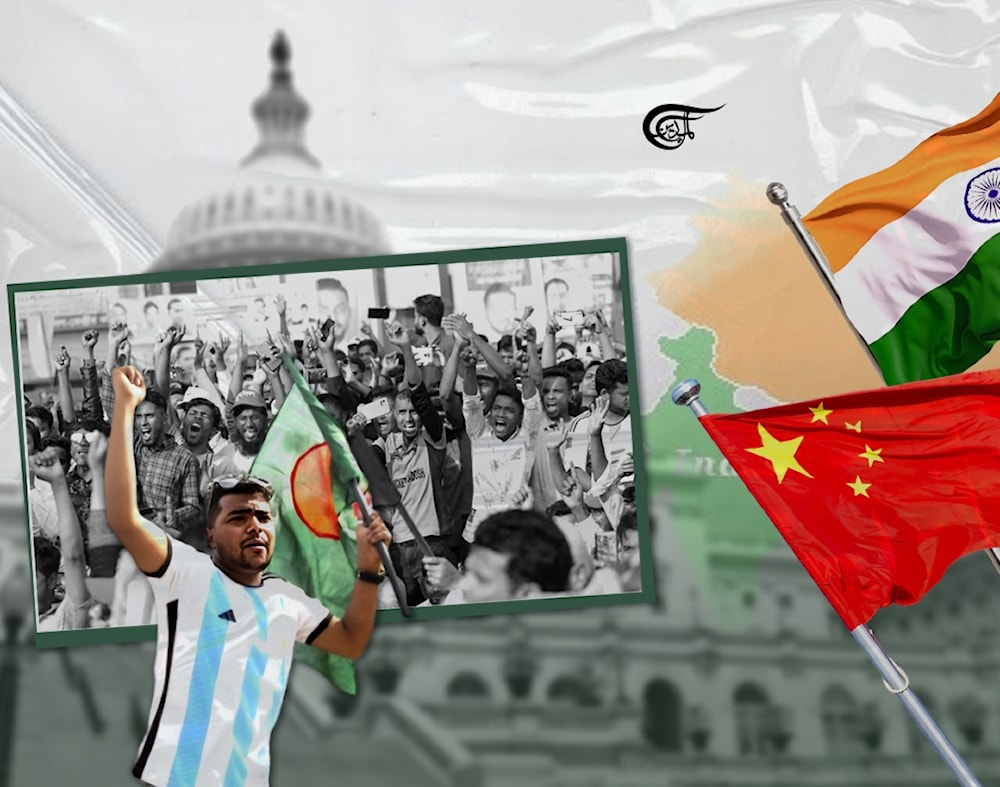Bangladesh's student protests amid a tug of war between India, China
What started as protests against the government's job quota system has grown into a larger attack on foreign influence, economic stagnation, and authoritarian control.
-

Bangladesh's geopolitical stance is being scrutinized amid internal unrest (Illustrated by Zeinab Chamas; Al Mayadeen English)
Bangladesh's internal discontent and rising dissatisfaction with Prime Minister Sheikh Hasina's administration's authoritarian approach have been brought to light by student protests against the government's employment quota system. In addition, Bangladesh's geopolitical delicate balance between China and India confronts additional difficulties as the United States attempts to include Dhaka in its Indo-Pacific strategy to counterbalance China's influence.
What started as protests against the government's job quota system has grown into a larger attack on foreign influence, economic stagnation, and authoritarian control. Bangladesh's multipolar position becomes more vulnerable as it negotiates its geopolitical connections, especially with China and India.
Background
The 2018 anti-quota movement planted the seeds for the current quota reform push. The Bangladesh High Court denied on March 8, 2018, a suit contesting the validity of the quota system, which has been in place since the early 1970s. Prime Minister Sheikh Hasina responded by announcing that she would keep the quota in place for women, religious minorities, and veterans of the liberation war. The quota stood at 55% of all civil service jobs, and as students face bleak employment prospects with nearly 32 million young Bangladeshis unemployed, this becomes a serious concern for young job seekers.
This decision, viewed as an emotional matter for Hasina, triggered a major student agitation. In response to the protests, Hasina canceled all quotas in the Bangladesh Civil Service through an executive order. However, this drastic move shocked the students, who had sought reform rather than abolition. Over the next two years, despite multiple rounds of discussion, Hasina remained firm in her decision, and in 2020, the executive order became operational, eliminating all quotas.
After the recent re-election of Sheikh Hasina’s party, the Awami League, on June 5, 2024, the Bangladesh High Court nullified Hasina’s executive order, restoring all quotas in the civil service. This judicial intervention is seen as an attempt by Hasina to bring back the quota system through a judicial proxy. This decision reignited the protests as it became apparent that Hasina might attempt to reinstate a substantial quota system, sparking the current wave of protests, which remained peaceful until July 19th.
The agitation started right after Prime Minister Sheikh Hasina’s Beijing visit, from which she returned disappointed and seemed visibly displeased. In a press interview, she labeled the protesters as "Razakars" – a term for collaborators with the Pakistani army during the 1971 war – to delegitimize the movement. The students reacted to such labeling, and clashes broke out across the country. Demonstrators were faced with live bullets, sound grenades, and tear gas by security personnel. During the violent protests in Bangladesh, at least 174 individuals lost their lives and almost 2,500 people were arrested.
India and China: The tug of war for Bangladesh
Bangladesh's geopolitical stance is being scrutinized amid internal unrest. The recent trips to China and India by Prime Minister Hasina highlight the careful balance Dhaka tries to keep between these regional heavyweights.
When Hasina visited New Delhi in June, she reaffirmed Bangladesh's close ties with India. Over the past 15 years, India has provided substantial political support to Hasina's Awami League, fostering a relationship that many perceive as overly dependent. Agreements reached during the visit included enhanced rail transit and cooperation on the Teesta River Comprehensive Management and Restoration Project, which marginalizes Chinese involvement in Bangladesh's infrastructure.
Hasina's subsequent trip to Beijing was less fruitful. Despite Bangladesh's request for $5 billion in low-cost budget support, China offered a much smaller sum of 1 billion yuan ($137 million) and proposed high-interest trade facilities instead. Analysts attribute Bangladesh's economic instability and seeming bias toward India to China's reluctance to give more loans.
The role of the US
Bangladesh's aspirations to become a multipolar nation are complicated by India's growing alignment with the US and the strengthening of its own strategic vision. Bangladesh's geopolitical calculations are influenced by the US-Indian relationship, which is motivated by common worries regarding China's regional aspirations. One could interpret Dhaka's strategic concessions to New Delhi as a component of a larger Indo-US endeavor to balance China in South Asia.
The goal of the US Indo-Pacific policy is to use a combination of diplomatic alliances, economic partnerships, and military presence to restrain China's growing influence in the region. This plan is commonly known as the "China containment" policy. The cornerstone of this strategy is the Quadrilateral Security Dialogue (Quad), which aims to advance an open and free Indo-Pacific through cooperative military drills, infrastructure development, and coordinated responses to regional issues. The Quad is made up of the United States, India, Japan, and Australia.
India's geographical position, big population, and strong military capabilities make it a major part of this plan. India strengthens the Quad's geopolitical clout as a counterweight to China and adds to the alliance network that supports the Indo-Pacific strategy. India's engagement with Bangladesh is seen by the United States as essential to expanding the scope of this approach. The United States seeks to further isolate China and fortify a coalition of like-minded countries dedicated to upholding American hegemony and resisting Beijing's influence by pushing Bangladesh to align more closely with India and the larger Quad framework.
Bangladesh's economic and military reliances further exacerbate its precarious strategic posture in the Indo-Pacific area. The export of ready-made clothing (RMG), mostly to the US and Europe, is a major driver of the nation's economy. This industry contributes significantly to Bangladesh's GDP and forges financial ties with Western markets, which affects the country's foreign policy decisions.
Furthermore, Bangladesh's military, one of the most prominent and reputable institutions in the nation, gains a great deal from taking part in UN missions. Bangladesh's interests are more aligned with those of the United States and Europe through these missions, which are very profitable for military officers and cultivate close ties with Western nations. Bangladesh's aspirations to become multipolar are challenged by this alignment of its economy and military, as it gets more intertwined with Western geopolitical strategies. Bangladesh's future security and prosperity will depend on its capacity to maintain a balanced foreign policy in the face of these pressures as it grows into one of the biggest Asian economies.
Linking this to the larger Indo-Pacific strategy, the US wants to use these military and economic connections to further entice Bangladesh into its orbit. The United States seeks to include Bangladesh in a coalition that backs a pro-Western Indo-Pacific by fostering stronger ties through economic and military cooperation. This will make it more difficult for Dhaka to sustain a multipolar, balanced position in the face of escalating regional tensions.
The changing dynamic for the Bangladeshi government
Bangladesh is faced with a difficult picture due to the combination of international maneuvering and domestic instability. Although the government's authoritarian methods of repressing dissent may temporarily increase its hold on power, they run the danger of alienating a sizable section of the populace. Bangladesh's options may be limited internationally due to its perceived affiliation with the United States and India, particularly if its relations with China continue to deteriorate.
Sheikh Hasina's Awami League party has a longstanding alliance with India dating back to the 1971 War of Liberation. But in 2016, the government of Bangladesh, led by the Awami League, broadened its coalitions when it managed to obtain a huge $24 billion loan from China to finance a number of infrastructural projects. These projects include building the Karnaphuli Tunnel, which improves connectivity in Chittagong, the nation's industrial powerhouse, and the Padma Bridge, which links the provinces in the southeast to the capital and the rest of the nation. These massive projects highlight the significance of Chinese investment in Bangladesh's development and are essential to the country's economic prosperity.
China aimed to establish itself as a major economic partner and increase its influence in Bangladesh by participating in these large-scale infrastructural projects. However, the recent geopolitical shifts and the Awami government’s strategic concessions to India have strained this relationship. The allocation of the Teesta River Comprehensive Management and Restoration Project to India and the use of Chinese-built bridges for Indian rail transit have sparked concerns about Bangladesh's sovereignty. Moreover, Indian intelligence's grip over Bangladesh's police is a concern for analysts and bystanders.
China expressed profound regret during Prime Minister Sheikh Hasina's recent visit to Beijing when China only contributed 1 billion yuan ($137 million) instead of the desired $5 billion in low-cost budget support. This limited financial assistance, in stark contrast to the grand promises of previous years, reflects Beijing’s frustration with Bangladesh's growing tilt toward India and its strategic concessions that favor New Delhi's interests. The apparent favoritism toward India complicates Bangladesh's efforts to maintain a balanced, multipolar stance, particularly as it emerges as a significant economy in Asia.
The challenge for Bangladesh now lies in navigating these internal and external pressures while striving for economic growth and political stability. Balancing relationships with major powers like China and India, alongside addressing domestic grievances, will be crucial for its future trajectory.

 Ahmed A. Shahbaz
Ahmed A. Shahbaz
 9 Min Read
9 Min Read







